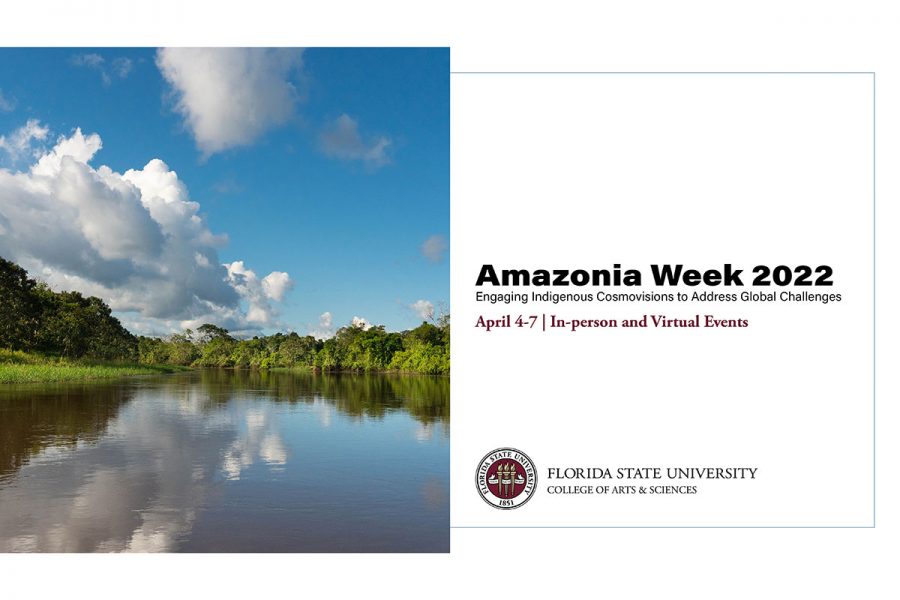
Florida State University’s College of Arts and Sciences and the Department of Modern Languages and Linguistics will welcome experts from Latin America for an interdisciplinary exploration of critical issues affecting the future of the Amazon and its people April 4-7.
FSU’s Amazonia Week brings together the perspectives of Indigenous cultures, humanists, Amazonian community leaders, modern Amazonian artists and scientists to meet current sustainability challenges and address the survival of all species. Each session will encourage attendees to examine the biological, environmental and humanitarian challenges in the Amazon and continue a clarion call to action for global intervention in this endangered region.
This annual event draws attention to knowledge systems and scientific literacies developed by Amazonian communities over thousands of years to interpret globalization, climate change and contentious human relationships with Earth’s biosphere. Amazonian cosmovisions — the worldviews and perspectives of Indigenous people rooted heavily in the interconnection of humans and the natural world — can help untangle the complexities of our multicultural and multi-natural worlds.
“Among the invited speakers for 2022 are participants with diverse backgrounds who contribute to the analysis of the current Amazonian crisis from different perspectives,” said Diego Mejía Prado, teaching professor of Spanish and one of Amazonia Week’s co-organizers. “Poets, scientists, humanists and Amazonian activists will meet in virtual and face-to-face spaces of FSU to share their visions on this land and to highlight alternative responses to the global challenges Amazonia is facing.”
The Amazon encompasses 40 percent of South America. It extends across nine countries and includes over 300 Indigenous languages and cultures as well as four European languages. It is the site of historic and continued conflict, as well as being the largest and most biodiverse rainforest in the world.
“As widespread deforestation and extraction imperil the Amazon’s biomes and cultural diversity, FSU’s Amazonia Week has positioned itself to be a crucial site for voices of the humanities, sciences and the local community to renew environmental consciousness and call to stop the deterioration of the world’s largest carbon sink,” said Juan Carlos Galeano, Amazonia Week founding organizer and professor of Spanish.
All events are free and open to the public. Sessions are presented in English unless otherwise noted. All Zoom sessions are available via https://fsu.zoom.us/j/95918890092#success.
Visit the FSU events calendar for more information on the speakers.
Events will include:
MONDAY, APRIL 4
Virtual Welcome, 2:30 p.m.
- Reinier Leushuis, chair of the Department of Modern Languages and Linguistics
Virtual Round Table and Discussion, 2:40 p.m.
- “Representations of the Rainforest: Student Perspectives on the Amazon,” featuring FSU students Alyssa Ackbar, Christopher Ahrendt, Mariana dos Santos, Giovanni Grossi, Andre Heizer and Milena Watt
Virtual Panelist Presentations and Discussion, 4:30-5:30 p.m.
- “Writing the Amazon: Student Perspective on the Amazon”
- “Re-writings Amazonian Storytelling,” a presentation by FSU student Alice Lopez, and “The Dolphin Legend and Violence against Women in the Amazon,” a presentation by FSU student Isabella Damasceno
TUESDAY, APRIL 5
Virtual Panelist Presentations and Discussion (presented in Spanish), 1-2:30 p.m.
- “Amazonia Viva o colapso universal.” Scholar Jorge Pulecio, Universidad Nacional de Colombia
- “Justicia social y ambiental para los habitantes de las riberas.” Community leader Carlos Abt, Loreto, Perú
- Following the presentations, Pulecio and Abt will discuss the critical importance of the Amazon rainforest for life on Earth, and the impacts that the rapid destruction of ecosystems have on the Indigenous and riverine people who depend on the river to sustain their communities, as well as the environmental and social justice activities that are underway on their behalf. There will be a question-and-answer session to follow.
Virtual Panelist Presentations and Discussion, 3:30-5:30 p.m.
- “The Global Importance of Amazon Freshwaters.” Claire Beveridge, Florida International University
- “Amazon Freshwater Conservation Targets” Elizabeth Anderson, Florida International University
- “The Smell of Water: A Liquid Witness to Environmental Change in Amazonia.” Chanelle Dupuis, Brown University. There will be a question-and-answer session to follow.
WEDNESDAY, APRIL 6
Virtual Panelist Presentations and Discussion (presented in Spanish): 1-2:30 p.m.
- “El mundo vivo: Relatos indígenas y textualidades (alternativas) en un mundo globalizado.” Michael Uzendoski, FLACSO Ecuador
- “Oralituras en la Amazonía Colombiana.” Miguel Rocha, Universidad Javeriana in Colombia
- Following the presentations, Uzendoski and Rocha will discuss the value of Indigenous oral histories and stories in the context of a globalized world. There will be a question-and-answer session to follow.
Virtual Presentation (presented in Spanish), 3:30-5:00 p.m.
- Jeremy Larochelle, University of Mary Washington professor, presents “Visiones ecológicas en la poesía amazónica contemporánea,” an introduction and readings of the poetry of Ana Varela Tafur, Carlos Reyes Ramírez and Percy Vílchez Vela
THURSDAY, APRIL 7
Strozier Library, Bradley Reading Room, 3-4:30 p.m.
- Photography exhibition : “Biodiversity crisis in Amazonia,” an exhibition introducing Amazonian natural history by FSU alumnus Diego Mejía Prad
- Closing Reception




